Each month, we highlight relevant author birthdays to celebrate. In the post below, click on the author’s name to find titles by them in our catalog. Read a little bit about each author, then follow the link to learn more about them in one of our databases!
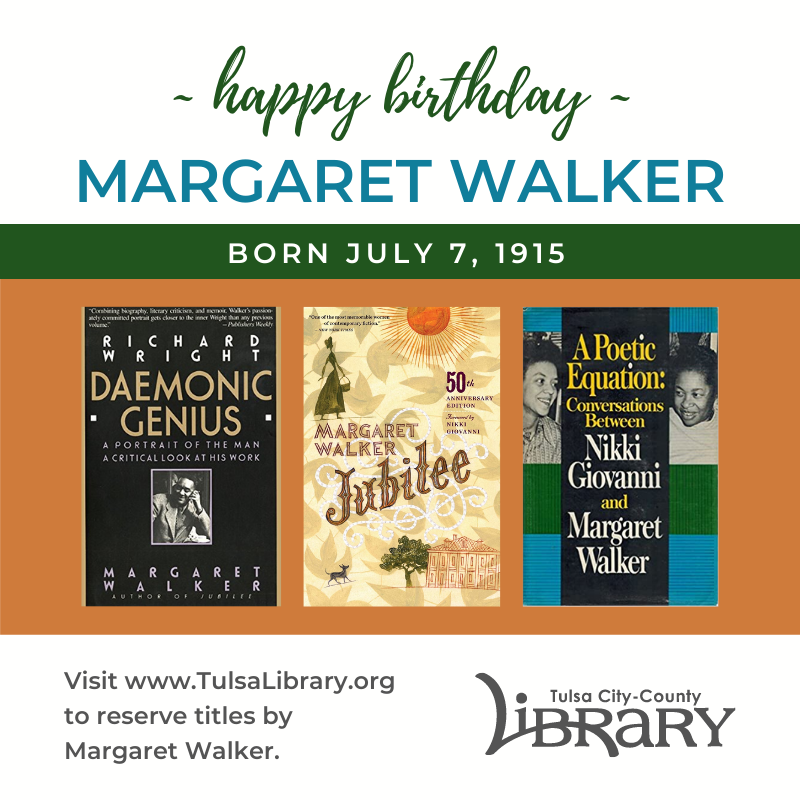 Margaret Walker (born July 7, 1915): "Margaret Abigail Walker was born in Birmingham, Alabama on July 6, 1915. Her father, Sigismond, was a native of Jamaica who earned a theological degree and was ordained as a black Methodist minister, and her mother, Marion, was a college-educated musician. Walker was one of four children born to them. Together they instilled in their daughter an awareness of and respect for the power of words. Walker found her communicative talent in poetry, which she began writing at age 12. She enrolled at Northwestern University and earned her bachelor's degree in 1935. After graduation, she remained in Chicago for the next four years to work, holding various publishing jobs as a typist, a newspaper reporter, an editor of a magazine, and a member of the Works Progress Administration's Federal Writers' Project. Her participation in this latter group led to her introduction to several politically active writers of the Chicago Renaissance, such as Nelson Algren, Richard Wright, James Farrell, Studs Terkel, and Gwendolyn Brooks." From her bio in our African American Experience database. Read the full piece HERE.
Margaret Walker (born July 7, 1915): "Margaret Abigail Walker was born in Birmingham, Alabama on July 6, 1915. Her father, Sigismond, was a native of Jamaica who earned a theological degree and was ordained as a black Methodist minister, and her mother, Marion, was a college-educated musician. Walker was one of four children born to them. Together they instilled in their daughter an awareness of and respect for the power of words. Walker found her communicative talent in poetry, which she began writing at age 12. She enrolled at Northwestern University and earned her bachelor's degree in 1935. After graduation, she remained in Chicago for the next four years to work, holding various publishing jobs as a typist, a newspaper reporter, an editor of a magazine, and a member of the Works Progress Administration's Federal Writers' Project. Her participation in this latter group led to her introduction to several politically active writers of the Chicago Renaissance, such as Nelson Algren, Richard Wright, James Farrell, Studs Terkel, and Gwendolyn Brooks." From her bio in our African American Experience database. Read the full piece HERE.
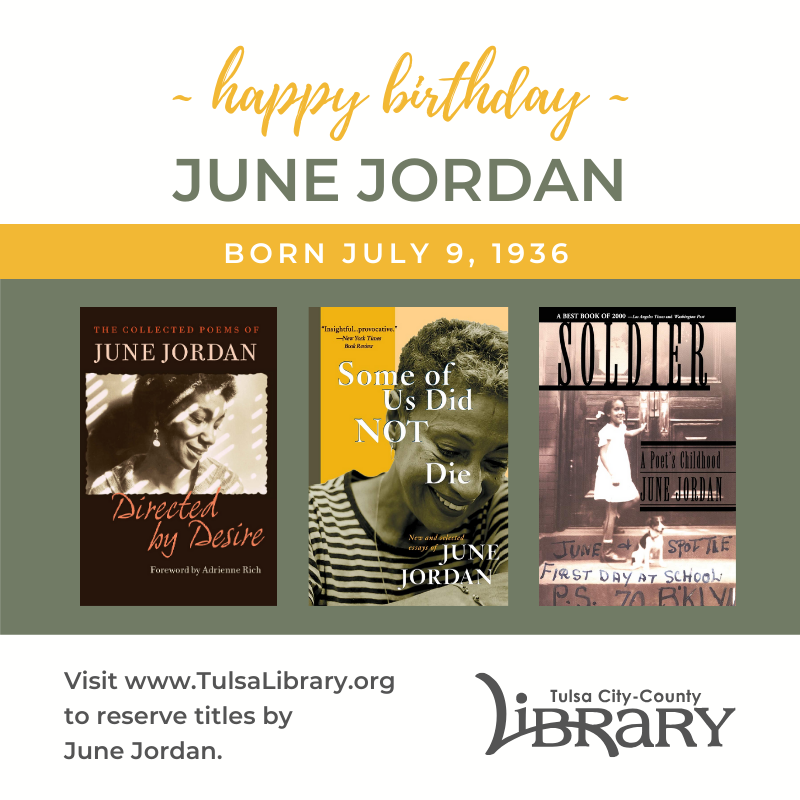 June Jordan (born July 9, 1936): "Prolific poet and writer June Jordan's work was shaped by her political activism, her intimacy with the African American community's experience, her humanitarian spirit, and her commitment to truth. Jordan was born July 9, 1936 in Harlem to Jamaican immigrant parents, Granville and Mildred Jordan, and grew up in the Bedford-Stuyvesant community of Brooklyn, New York. Her parents worked night shifts to increase their salaries, her father as a postal worker and her mother as a private nurse. Jordan was exposed to religious training primarily through her mother by their visits to the Universal Truth Center on 125th Street. Jordan also took piano and voice lessons and went to summer camp outside the city. She was writing poetry as early as age seven." From her bio in our African American Experience database. Read the full piece HERE.
June Jordan (born July 9, 1936): "Prolific poet and writer June Jordan's work was shaped by her political activism, her intimacy with the African American community's experience, her humanitarian spirit, and her commitment to truth. Jordan was born July 9, 1936 in Harlem to Jamaican immigrant parents, Granville and Mildred Jordan, and grew up in the Bedford-Stuyvesant community of Brooklyn, New York. Her parents worked night shifts to increase their salaries, her father as a postal worker and her mother as a private nurse. Jordan was exposed to religious training primarily through her mother by their visits to the Universal Truth Center on 125th Street. Jordan also took piano and voice lessons and went to summer camp outside the city. She was writing poetry as early as age seven." From her bio in our African American Experience database. Read the full piece HERE.
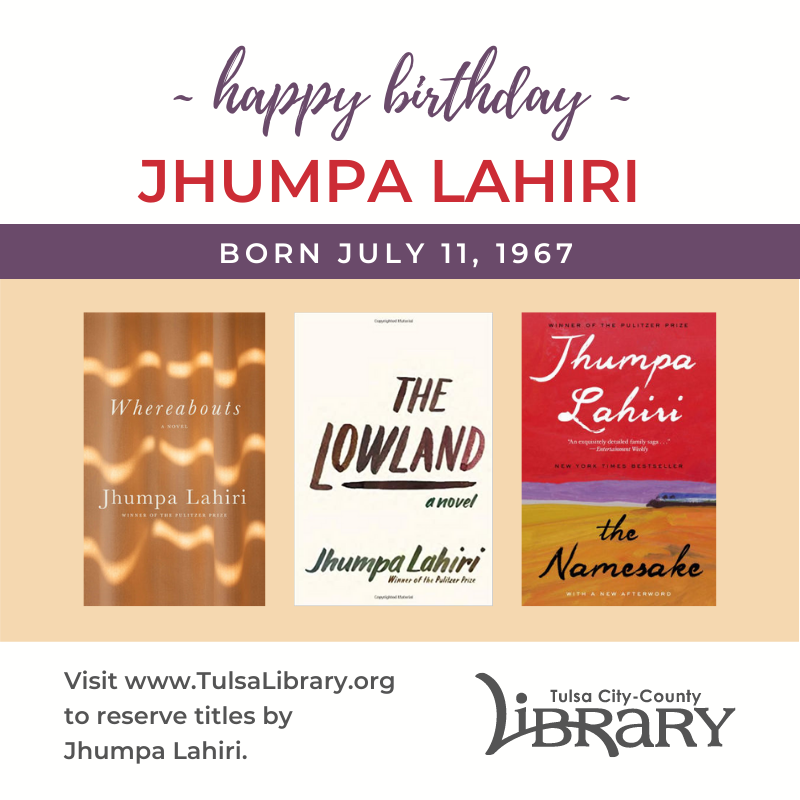 Jhumpa Lahiri (born July 11, 1967): "Jhumpa Lahiri writes fiction about the Indian immigrant experience in America. She surprised the literary world in 2001 when she won the Pulitzer Prize for fiction for her very first full-length effort, a collection of short stories titled Interpreter of Maladies. The daughter of Bengali parents who immigrated to the United States, Lahiri attended school in New England, but also spent considerable time while growing up visiting her extended family in Calcutta, India. She uses Calcutta as the setting for three of the nine stories in Interpreter of Maladies and accurately contrasts Indian values with American values in her other stories. The eloquent language, mature observations, and delicate insights belied Lahiri's newcomer status, according to many critics, who welcomed her second work of fiction, 2003's The Namesake. Lahiri's first novel, the book details the story of a young Indian man trying to maintain his family's traditional values while dealing with everyday life in America." From her bio in our Biography in Context database. Read the full piece HERE.
Jhumpa Lahiri (born July 11, 1967): "Jhumpa Lahiri writes fiction about the Indian immigrant experience in America. She surprised the literary world in 2001 when she won the Pulitzer Prize for fiction for her very first full-length effort, a collection of short stories titled Interpreter of Maladies. The daughter of Bengali parents who immigrated to the United States, Lahiri attended school in New England, but also spent considerable time while growing up visiting her extended family in Calcutta, India. She uses Calcutta as the setting for three of the nine stories in Interpreter of Maladies and accurately contrasts Indian values with American values in her other stories. The eloquent language, mature observations, and delicate insights belied Lahiri's newcomer status, according to many critics, who welcomed her second work of fiction, 2003's The Namesake. Lahiri's first novel, the book details the story of a young Indian man trying to maintain his family's traditional values while dealing with everyday life in America." From her bio in our Biography in Context database. Read the full piece HERE.
 Pablo Neruda (born July 12, 1904): "Pablo Neruda, the winner of the 1971 Nobel Prize for literature, is considered by many readers and critics to be the foremost poet of the Latin American world in the twentieth century. His poetry, which often taps into the deepest, most elementary aspects of nature and existence, has been tremendously influential. Neruda was also a passionate participant in politics. Many of his poetic works commented on political themes and issues. In addition, he was a visible and vocal supporter of communist causes. He thus traveled extensively in the communist world of the Cold War." From his bio in our Biography in Context database. Read the full piece HERE.
Pablo Neruda (born July 12, 1904): "Pablo Neruda, the winner of the 1971 Nobel Prize for literature, is considered by many readers and critics to be the foremost poet of the Latin American world in the twentieth century. His poetry, which often taps into the deepest, most elementary aspects of nature and existence, has been tremendously influential. Neruda was also a passionate participant in politics. Many of his poetic works commented on political themes and issues. In addition, he was a visible and vocal supporter of communist causes. He thus traveled extensively in the communist world of the Cold War." From his bio in our Biography in Context database. Read the full piece HERE.
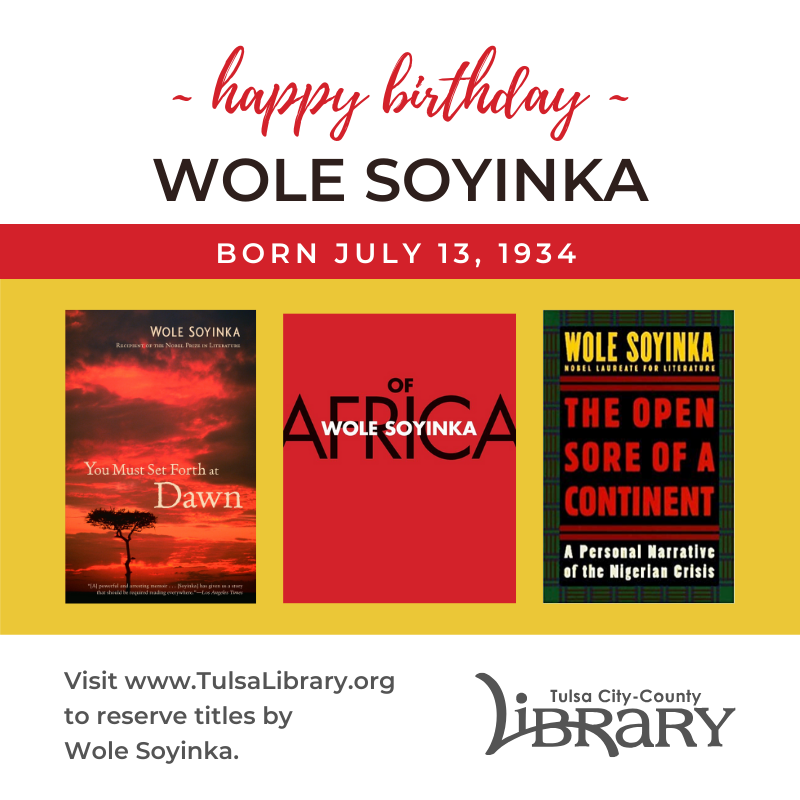 Wole Soyinka (born July 13, 1934): "In 1986 Wole Soyinka (pronounced WOH-leh Shaw-YIN-ka) won the Nobel Prize for literature, thereby becoming the first black writer and the first African to win the award. When the Swedish Academy presented him with the prestigious prize, its members praised his ability to describe the complex nature of his African culture. Soyinka and other African intellectuals have written that Westerners (meaning Europeans and Americans) have a distorted perception of Africa and its people--an inaccurate perception of Africa as a primitive land. In his desire to celebrate Africa, though, Soyinka does not romanticize his native land; he is as willing to charge Nigerian politicians with barbarity and corruption as he is to condemn the greed and materialism of the West." From his bio in our Biography in Context database. Read the full piece HERE.
Wole Soyinka (born July 13, 1934): "In 1986 Wole Soyinka (pronounced WOH-leh Shaw-YIN-ka) won the Nobel Prize for literature, thereby becoming the first black writer and the first African to win the award. When the Swedish Academy presented him with the prestigious prize, its members praised his ability to describe the complex nature of his African culture. Soyinka and other African intellectuals have written that Westerners (meaning Europeans and Americans) have a distorted perception of Africa and its people--an inaccurate perception of Africa as a primitive land. In his desire to celebrate Africa, though, Soyinka does not romanticize his native land; he is as willing to charge Nigerian politicians with barbarity and corruption as he is to condemn the greed and materialism of the West." From his bio in our Biography in Context database. Read the full piece HERE.
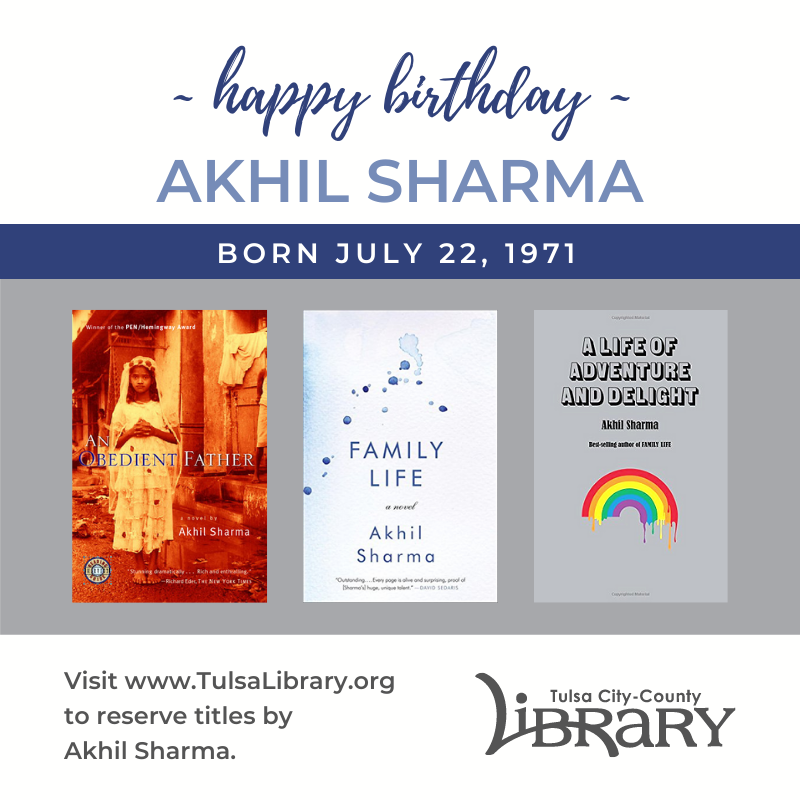 Akhil Sharma (born July 22, 1971): "Akhil Sharma was born in Delhi, India, in 1971. He moved with his family to the United States when he was eight years old. He grew up in New Jersey, where he and his family experienced extreme racism. People cursed at Sharma in the streets and even spat on him at school. The torment did not let up until he entered college. Throughout his adolescence and teens, he found solace in books, which were essentially unavailable in India. His love of books helped him with his college pursuits. Sharma went on to study at Princeton University and later at Stanford and Harvard Law School. In his early years, Sharma's main focused was making money. "I was writing, but it struck me as foolish to do something that I knew was so unlucrative," he told the Guardian. He added, "I admired and respected writers, but in the same way as I admired and respected social workers. It was not something I wanted to do myself." He initially worked in investment banking, but managed to write in his spare time and eventually completed his first novel." From his bio in our Biography in Context database. Read the full piece HERE.
Akhil Sharma (born July 22, 1971): "Akhil Sharma was born in Delhi, India, in 1971. He moved with his family to the United States when he was eight years old. He grew up in New Jersey, where he and his family experienced extreme racism. People cursed at Sharma in the streets and even spat on him at school. The torment did not let up until he entered college. Throughout his adolescence and teens, he found solace in books, which were essentially unavailable in India. His love of books helped him with his college pursuits. Sharma went on to study at Princeton University and later at Stanford and Harvard Law School. In his early years, Sharma's main focused was making money. "I was writing, but it struck me as foolish to do something that I knew was so unlucrative," he told the Guardian. He added, "I admired and respected writers, but in the same way as I admired and respected social workers. It was not something I wanted to do myself." He initially worked in investment banking, but managed to write in his spare time and eventually completed his first novel." From his bio in our Biography in Context database. Read the full piece HERE.
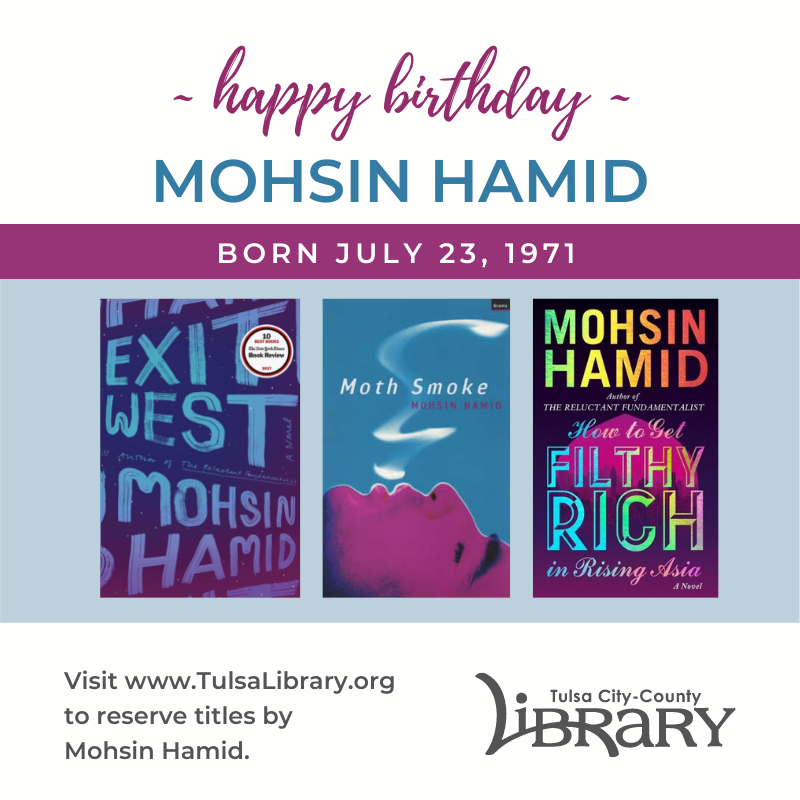 Mohsin Hamid (born July 23, 1971): "Mohsin Hamid earned intense praise for his fourth novel, Exit West, a love story set amidst the global refugee crisis. The Pakistani-British writer has been a prescient chronicler of political and economic shifts in twenty-first-century life--partly as a result of his two decades' experience as a management consultant--but collected especially fervent accolades for Exit West, which recounts the journey of a young couple who meet in an unnamed city besieged by Islamic fundamentalists and risk their lives to escape. Writing in the Atlantic, Sophie Gilbert described it as "a story about how familiar and persistent human existence is, even at the edge of dystopia. But it's also a warning against the assumption that the end of the world will leave rich, western countries unscathed."" From his bio in our Biography in Context database. Read the full piece HERE.
Mohsin Hamid (born July 23, 1971): "Mohsin Hamid earned intense praise for his fourth novel, Exit West, a love story set amidst the global refugee crisis. The Pakistani-British writer has been a prescient chronicler of political and economic shifts in twenty-first-century life--partly as a result of his two decades' experience as a management consultant--but collected especially fervent accolades for Exit West, which recounts the journey of a young couple who meet in an unnamed city besieged by Islamic fundamentalists and risk their lives to escape. Writing in the Atlantic, Sophie Gilbert described it as "a story about how familiar and persistent human existence is, even at the edge of dystopia. But it's also a warning against the assumption that the end of the world will leave rich, western countries unscathed."" From his bio in our Biography in Context database. Read the full piece HERE.
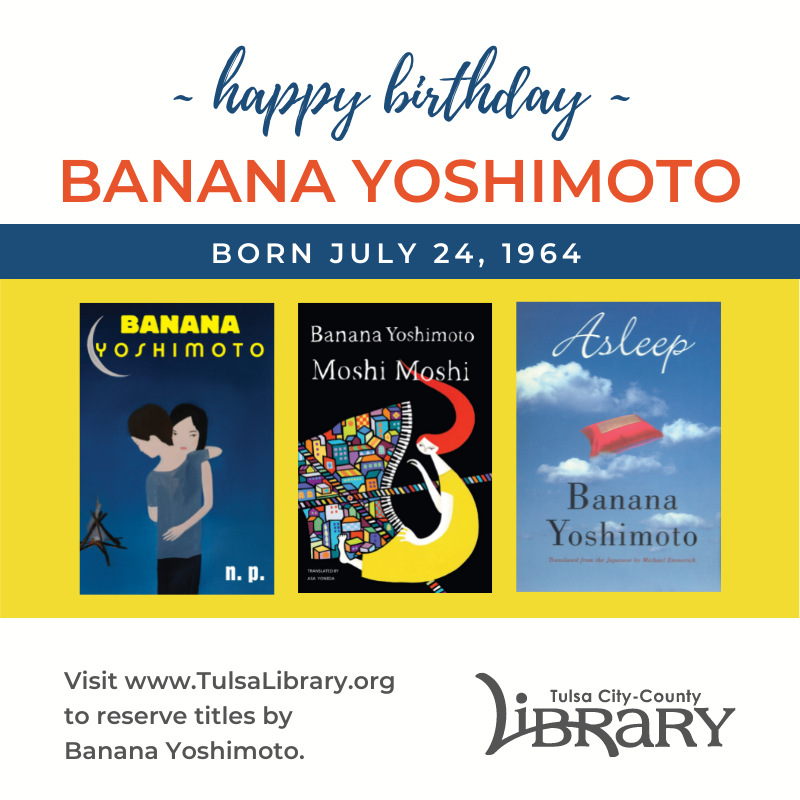 Banana Yoshimoto (born July 24, 1964): "Japanese novelist Banana Yoshimoto "favors short novels that gradually reveal thin, almost translucent layers of her characters' personalities," as a critic for Publishers Weekly once explained. The author has become a worldwide phenomenon, with millions of fans falling in love with her novels and waiting eagerly for the next one--a circumstance referred to on the many Web pages dedicated to her as "Banana-mania." Yoshimoto's fans tend to be fanatical in their devotion to her work, exchanging testimonials and gossip about the author on the Internet and anxiously speculating about which novel will be the next one translated into their own language." From his bio in our Biography in Context database. Read the full piece HERE.
Banana Yoshimoto (born July 24, 1964): "Japanese novelist Banana Yoshimoto "favors short novels that gradually reveal thin, almost translucent layers of her characters' personalities," as a critic for Publishers Weekly once explained. The author has become a worldwide phenomenon, with millions of fans falling in love with her novels and waiting eagerly for the next one--a circumstance referred to on the many Web pages dedicated to her as "Banana-mania." Yoshimoto's fans tend to be fanatical in their devotion to her work, exchanging testimonials and gossip about the author on the Internet and anxiously speculating about which novel will be the next one translated into their own language." From his bio in our Biography in Context database. Read the full piece HERE.
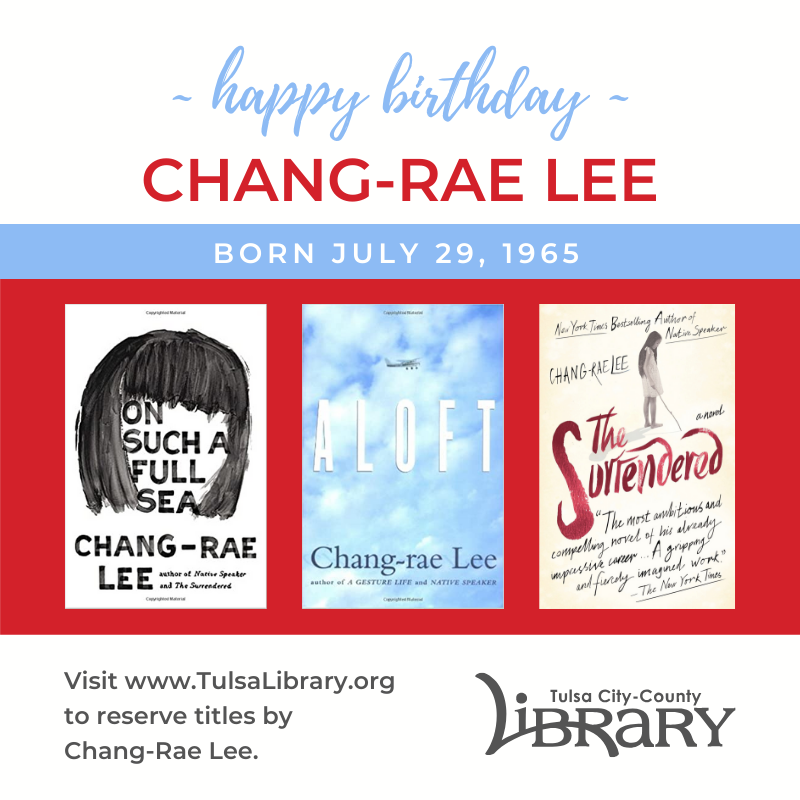 Chang-Rae Lee (born July 29, 1965): "Korean-born Chang-rae Lee has received numerous prestigious awards for his fiction, which explores the modern Asian immigrant experience. The central characters in Lee's novels experience a paradox: although successful, even affluent in their adoptive land, they feel alienated from both American culture and the cultures they left behind in the Far East. According to Andrew O'Hagan in the New York Times Book Review, Lee "expertly evokes the collision of unacceptable truth with the illusion of workaday serenity." Also in the New York Times Book Review, Rand Richards Cooper observed that Lee's novelistic interest "lies in language, culture and identity. ... Mr. Lee treads this familiar immigrant ground with skill and feeling."" From his bio in our Biography in Context database. Read the full piece HERE.
Chang-Rae Lee (born July 29, 1965): "Korean-born Chang-rae Lee has received numerous prestigious awards for his fiction, which explores the modern Asian immigrant experience. The central characters in Lee's novels experience a paradox: although successful, even affluent in their adoptive land, they feel alienated from both American culture and the cultures they left behind in the Far East. According to Andrew O'Hagan in the New York Times Book Review, Lee "expertly evokes the collision of unacceptable truth with the illusion of workaday serenity." Also in the New York Times Book Review, Rand Richards Cooper observed that Lee's novelistic interest "lies in language, culture and identity. ... Mr. Lee treads this familiar immigrant ground with skill and feeling."" From his bio in our Biography in Context database. Read the full piece HERE.